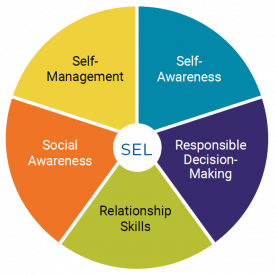
Bennett 29J, Strasburg 31J, and Weld RE-3J School Districtst
As the 2020 school year wound down, the Children’s Hospital of Colorado declared a state of emergency for youth mental health. Atop already high needs, the impacts of COVID-19 were devastating, resulting in a 90% increase in demand for behavioral health treatment and the emergence of suicide as the number one cause of death for children in Colorado.
With fewer resources available, the mental health epidemic has been felt acutely in Colorado’s rural communities. To address this crisis, the neighboring, rural school districts of Bennett 29J, Strasburg 31J, and Weld RE-3J partnered to harness the unique position of schools in communities to strengthen social-emotional learning and provide mental health support for students, their families, and school staff.
With a grant from the Governor’s RISE fund – Response, Innovation, and Student Equity Education – the three school districts partnered with the evidence-based TRAILS (Transforming Research into Action to Improve the Lives of Students) program to help them:
- Raise mental health awareness for all students,
- Provide support to students experiencing mental health difficulties, and
- Improve their ability to identify and quickly connect students at risk of suicide to care.

The Colorado Lab is supporting this effort, as well as the work of nine additional RISE grantees, to ensure the approaches being used grow to be effective in improving student and family outcomes. To lay the groundwork for long-term project success and sustainability, the Lab works with partners to identify and engage an Implementation Team for each of the RISE-funded projects. These implementation teams actively support planning, execution, improvement, and sustainability of their RISE-funded project.
The implementation teams for Bennett, Strasburg, and Weld came together in person last month to coalesce, learn, and launch their work. The convening began with the districts’ superintendents thanking the team’s elementary- and secondary-level teachers and mental health professionals for their expertise and dedication in taking on this work and pledging their support for efforts to improve students’ and teachers’ lives and educational outcomes.
The Colorado Lab will share lessons learned through the RISE grant projects with other schools who might benefit from similar approaches. If you would like to learn more about the RISE project, contact Dr. Kristin Klopfenstein.
Colorado’s RISE Fund has awarded over $40 million to address the learning challenges in pre-K-12 through higher education related to the economic, social, and health impacts of COVID-19. The Colorado Lab supports these RISE grantees in the effective implementation and long-term success and sustainability of their projects.
- A coalition of charter schools including AUL Denver, Colorado High School Charter, Academy 360, Girls Athletic Leadership Schools, RiseUp Community School, Highline Academy
- Adams 14 School District
- Bennett 29J, Strasburg 39J, and Weld RE-3J School Districts
- Centennial BOCES
- Bayfield, Silverton, Ignacio, Durango and Archuleta School Districts, with Pueblo Community College and Fort Lewis College
- Montezuma-Cortez High School
- Montrose County School District
- New Legacy Charter School
- Ute Mountain Ute Tribe
- West Grand School District